At the end of March 2021, a security agreement was leaked between China and the Solomon Islands, which caused counter reactions mainly from the neighboring nation Australia and the United States.
With the fear that the treaty would allow new Chinese military installations in the archipelago neighboring Australia, several countries have expressed concern about the possible increase in the militarization of the Indo-Pacific region.
However, China and the Solomon Islands have declared that this new agreement will only allow the deployment of Chinese troops to the Islands in cases of domestic conflict and maintenance of social order, without permission for military bases.
The United States has a long-standing alliance with Australia, and Australia has deep relations with the Solomon Islands. This dynamic was “disrupted” by this new declaration of interest from China.

The security treaty between Solomon Islands and China in the South Pacific
China and the Solomon Islands have been deepening their relationship in recent years, mainly in the commercial field, but the leaked security agreement was a novelty and a surprise.
The Solomon Islands are located 2,000 km north-east of Australia, with long-standing relationships. Australia has already provided military assistance for domestic conflicts in the archipelago, in the past year has invested US$1.3 billion in addition to US$49 million for the construction of a new embassy and US$16.5 million for government salaries, radio network for local police, health and disaster management.
With the new agreement between Solomon Islands and China, the international scene began to question the strength of the Islands’ relationship with Australia, especially after providing assistance 24 hours after the Solomon Islands’ request with protests in the capital Honiara recently in 2021.
When drawing a deal with China, which has not yet been confirmed, it shows that Australian assistance is not being considered sufficient.
Taiwanese media reported that Beijing had given US$500 million to Solomon Islands to sever relations with the other self-governing islands, in which they consider themselves part of the sphere of influence of China. At the same time, Australian opposition politicians reported that parliamentarians earned AUD$250,000 to 750,000 to vote in favor of the country’s interests against the Chinese advance in the region.
Therefore, this agreement became a matter of dispute over the influence on the territory and politics of the Solomon Islands.
The popular opinion of Solomon Islands is more favorable to deepen relations with its former partner, Australia, since China has caused several climate changes for national fishing. However, the government believes that relations with the Asian power are beneficial for the country in the medium and long term.
In 2019, the Solomon Islands signed a trade agreement with Beijing that denied the legitimacy of Taiwan, which follows Chinese interests in the regional conflict. However, China says that this is just a project for the economic development of the archipelago, which can mean one of the cases of Dept Trap (debt trap).
The leaked agreement allowed China to send troops and policing with the aim of “help maintain social order” in the Solomon Islands. What many were saying was that this would give freedom to the establishment of Chinese military bases in the country of Oceania, but both countries denied it.
What is the Aukus Alliance (security pact between the US, UK and Australia)
The Solomon Islands have partnered with Australia since the end of World War II, but the agreement with China demonstrates a failure in Australian diplomacy to strengthen this alliance with the islands, which affects the AUKUS partnership that operates in the Indo-Pacific.
AUKUS is a security treaty between Australia, the United Kingdom and the United States, released to the public on 15 September 2021. It has the goal of every 18 months to equip Australia with military and nuclear submarine technologies, which really will not come into use until 2040.
Australia is part of the NPT (Treaty on the Non-proliferation of Nuclear Weapons) not being permitted to possess nuclear weapons and having limitations on the use of nuclear energy. However, with AUKUS, nuclear submarines are allowed because of “loopholes” in this agreement.
Nuclear submarines are not weapons, only submarines that use nuclear energy as fuel. They are a technological breakthrough within the military submarine field, as they can stay submerged longer by being exceptional in stealth attacks. Only 6 countries have this type of submarine: the US (68), Russia (29), China (12), United Kingdom, France and India.
The treaty caused tensions with China and the European Union, as it is an action that excluded member states and whose main objective is to militarize the Indo-Pacific area to have military contingent against Chinese advances.
France was in billion-dollar negotiations with Australia to supply this type of submarine, but Canberra decided to deny and stop negotiations to close the agreement with the United Kingdom and the US.
Criticism within the EU is mainly due to being an alliance of militarization that did not include NATO, but the Secretary General of the organization said that the agreement was not “directed against NATO or Europe” and that it would continue to work with its Indo-Pacific partners, New Zealand, Australia, Japan and South Korea, on cybersecurity, maritime and other issues.
AUKUS is part of the “Pivot to Asia” or “Pivot to the East” that the US seeks and initiated during the Barack Obama administration. In order to rebalance the country’s resources and priorities in relation to China and its growth, the US invested in greater relations with the Indo-Pacific countries.
“The United States wanted to show China that it would compete economically, diplomatically, and militarily on its own turf. Additionally, the pivot would help disentangle the United States from the Middle East, where it had been bogged down for nearly a decade in wars in Iraq and Afghanistan.”
The Diplomat
An example of the new military strategy related to “Pivot to the East” was the establishment of a permanent rotating base with 2,500 US Marines in Darwin, Northern Australia.
How China wants to change the balance of power in the Indo-Pacific region
As you can see, the tensions between Washington and Beijing in the Indo-Pacific are constantly occurring in a conflict of power and influence over the region.
Alliances between Australia-Solomon Islands-United States have an established relationship dynamic. The aid that Australia gives to its neighbour is possible because of the historical support that the American power provides to Australia itself.
Chinese interest in the Solomon Islands has increased tension not only for Australia, but for neighbors in the Indo-Pacific as well. Vietnam and Malaysia are countries which are seeking further support with the US following the conflict in South China Sea, and see this new alliance of the archipelago as a form of advancement that China seeks over its regions.
Security agreements mean more than just the terms on paper, they are issues that change the geopolitical scenario. A BBC placed this new relationship as an attempt by China to “disturbing the benign environment that nations have enjoyed for decades – and which is now collectively maintained by Australia, New Zealand and the nations of the Pacific Islands Forum.”
However, the geopolitical scenario is formed of interests in constant conflict, being “benign” for some and “evil” for others. While the US settles in the Indo-Pacific region, Chinese interests are blocked and vice versa in the opposite movement.
The quest to establish greater alliances is part of the commitment of nations to have greater security and national sovereignty.
As Solomon Islands Prime Minister Manasseh Sogavare, placed on the country’s position in this conflict of interest:”We are friends of all and enemies of none.”
The future trend of geopolitical conflicts in the pacific between China and the United States
With increasing tensions and conflicts in the Indo-Pacific, the possibility of diplomatic accidents and small and medium-scale conflicts between the United States and China also increases.
The great military support of the United States to Ukraine in its conflict against Russia was not part of the American plans at the time because this had its current and growing focus in the last decades in a possible conflict with a China. The Pivot to Asia and AUKUS are examples of the project that was underway for this purpose. However, the agreement between China and the Solomon Islands came at a time when the spotlight turned to Eastern Europe.
China has taken advantage of the momentum of the international scene to continue and expand its goal of creating greater relations from developmental projects in their regions of interest.
Indo-Pacific has a high chance of becoming an environment of hybrid and armed conflict for the allies of the United States to face China and their own allies. It is a geopolitical conflict at the time of forming alliances that may become an armed conflict in the future if there is “miscalculation” by the actors involved.
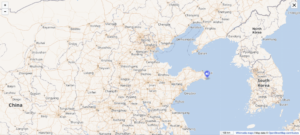

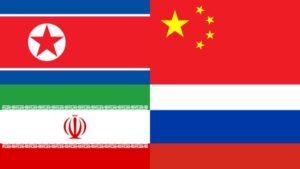
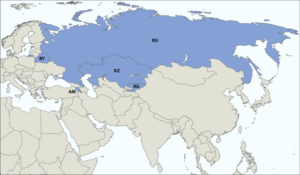


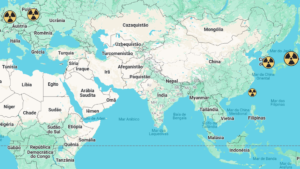
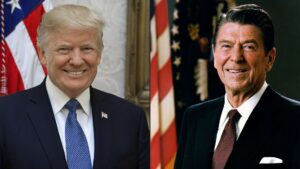
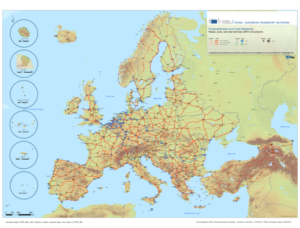







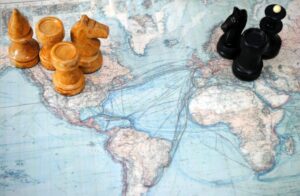


[…] (BRI) program. With the purpose of increasing economic relationships with countries on the South of Asia, Middle East and North Africa, the Chinese government intends to invest about US$4 trillion (about […]
[…] to this importance, regional alliances between AUKUS and QUAD countries aim to maintain regional security – whether land or sea – to guarantee the principles of the Global Liberal Order, international […]
[…] The other geopolitical actors have increasingly invested in clean energies to achieve their energy sovereignties. The European Union has its initiative REPowerEU, , China has made more and more investments in renewable energy. […]